Strictly Personal
The irony of education in mother language in Ghana, By Obed Dadzie
Published
10 months agoon

Language is undoubtedly, man’s primary means of communication. The Oxford Advanced Learner’s Dictionary defines language as “the system of communication in speech and writing that is used by people of a particular country or area”. Language is an important aspect of human life without which communication cannot occur. This also explains why two people or groups of people who do not speak the same language are unable to communicate or understand each other.
According to the Holy Bible (Genesis 11:1-9), the whole earth had one language and speech and decided to build a city, with a tower that reaches the heavens. Then the Lord confused the language of all people and they were unable to proceed with their plans. It indicates how people who speak the same language are able to identify and associate with each other.
Ghana, our beloved country, has several dialects spoken locally, including Asante Twi, Akuapim Twi, Ga, Nzema, Fante, Ewe, Dagbagni, Gonja, etc. However, English is adopted as the official language because it facilitates communication with anyone who understands and speaks it, irrespective of ethnic group and location in Ghana, and the world at large. It is also the medium of instruction in our education system. Most students and youth of today are trying their very best to read, write and speak the English language at the expense of their mother tongues. Most parents are also caught up in the phenomenon as they also speak the English language even at home with their children with the aim of making them achieve mastery of the English language. This is because some are of the view that children who are not introduced to the English language at early stages later struggle to express themselves or achieve proficiency in English. I recall a conversation with one student who told me unashamedly and unperturbed that she could neither read nor write in her own Ghanaian dialect, rendering her an illiterate in her own mother language. Indeed, majority of the youth, particularly students, are unable to read and write their native or local languages at all or struggle to do so. Others can hardly give a narration in their local languages without mixing them with some English terminologies or expressions, not to talk about dealing with figures in the local languages.
Two schools of thought are of different opinions on the subject. One school of thought believes that introducing kids to or speaking English language with them has become a necessary evil. This is because the current situation where English language is made an important aspect of our education system and the impact it could have on one’s life makes it imperative for more attention to be paid to it. As a result, most parents speak English language with their kids at home with the belief that they (kids) would definitely understand and know how to speak the local dialects by way of socialisation with their peers in their environments or through contacts with their communities. Some posit that it is important to pay much more attention to the language that makes it possible for one to interact with people worldwide or could enable one to secure a well-paid job or offer other better opportunities.
The other school of thought opines that people, especially children, should not be made to lose their sense of identity or culture by first introducing them to foreign (English) languages. They also aver that children learn or understand concepts better when first taught in their local languages. United Nations Educational, Scientific and Cultural Organisation (UNESCO), having recognised the importance of the mother language education has instituted International Mother Language Day which is observed worldwide on February 21, each year. UNESCO is of the firm belief that educating children in their early years in their mother tongues lay a good foundation for learning. Some individuals, bodies or other stakeholders in education bemoan or have spoken against this phenomenon of disregarding education in our local languages. Much as I agree with them, the big question is ‘na who cause am’? (who caused it?).
Speaking the local languages in schools seems to have become a taboo and pupils are often penalised for doing so. Also, the ability to speak English fluently is associated with intelligence by most people today. There seems to be a halt in the publication of books in the local languages as it used to be, such as the once interesting, educative and popular ‘Nyimdzeekwan’ or ‘Nimde3 kwan’, Fante and Asante Twi respectively, published by the Bureau of Ghana Languages; ‘Abofra Nyansafo No’ by Methodist Book Depot, among others which were read with relish and full of wisdom and life lessons.
Again, English language is one of the core subjects studied in our schools and progression from one level to the other (JHS-SHS-Tertiary) is strictly dependent on passing its examination. Obtaining excellent grades in all subjects except English language (Basic Education Certificate Examination (BECE) and West African Senior Secondary Certificate Examination (WASSCE) or even passing with a grade ‘D7’ in WASSCE shall still deny one access to any tertiary institution in Ghana, leading to the shattering of one’s dreams, with the exception of diploma or certificate programmes in some cases. One would then have to face several ‘world wars’ (resits) until he or she passes with at least grade C6. Moreover, one’s inability to express himself or herself well in the English language mostly militates against his or her chances of securing employment, particularly white collar job. Most job seekers get their applications turned down because their level of English is not considered good enough.
The gravity of the problem is exemplified by the story of one Nathaniel Nii Cudjoe (now Dr Cudjoe) who scored seven ‘A1s’ in all subjects but a ‘B2’ in English language after sitting for the WASSCE in 2015. This brilliant young man almost had his life’s dream shattered. What was his crime? It is alleged that it was simply because he scored a grade ‘B2’ instead of ‘A1’ in English language, despite scoring ‘A1’ in all subjects. Consequently, he was offered Bachelor of Pharmacy, instead of the Bachelor of Medicine he applied for and had been dreaming for, by one of the best universities in Ghana. After reading the Pharmacy for a year, he pressed harder towards his goal by applying for Bachelor of Medicine at University of Cape Coast (UCC) and graduated successfully with a very enviable record of sweeping sixteen (16) out of the twenty-two (22) awards at stake, at the 2nd session of UCC’s 55th Congregation. Only God knows the number of people who might have suffered similar fate in one way or the other but were not lucky to experience such an amazing turnaround of events in their lives.
It is against this backdrop that most people are obsessed with the English language to the detriment of their mother tongues. The youth or students of today could therefore, not be blamed much because we have put a system in place that is contributing to the challenge we are encountering. They seem to be dancing to the rhythm of the system we have put in place. One might not be expected to dance ‘Adowa’ or any traditional dance when reggae song is being played or vice versa. There is, therefore, the need for concerted effort to address the challenges contributing to the waning interest in education in our mother languages.
The writer is a library staff member at University of Education,
You may like
-


Legendary American music icon Stevie Wonder becomes full Ghanaian citizen
-
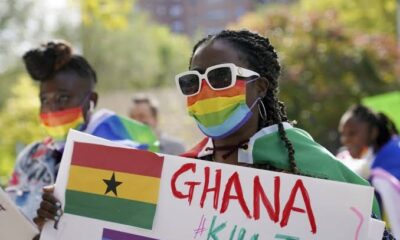

Ghanaian Supreme Court begins hearing in case challenging anti-LGBTQ+ bill
-
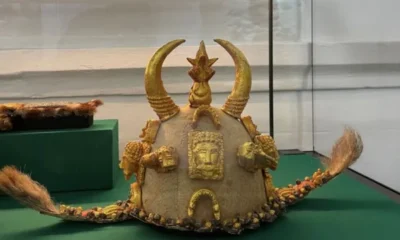

Ghanaians celebrate return of Asante Gold artefacts looted by British
-


African men run away from single mothers— Joselyn Dumas
-
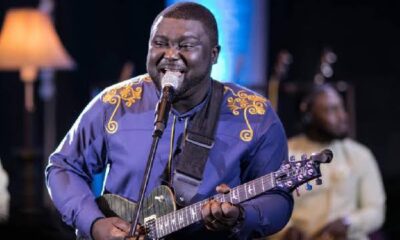

Ghana mourns as top gospel music icon Koda passes away
-
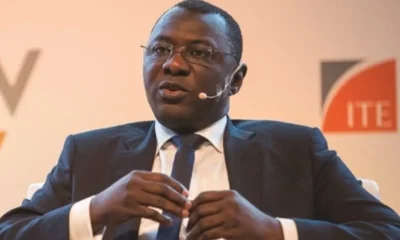

Ghana’s finance minister anticipates debt restructuring MoU with lenders
Strictly Personal
If I were put in charge of a $15m African kitty, I’d first deworm children, By Charles Onyango-Obbo
Published
1 week agoon
May 13, 2024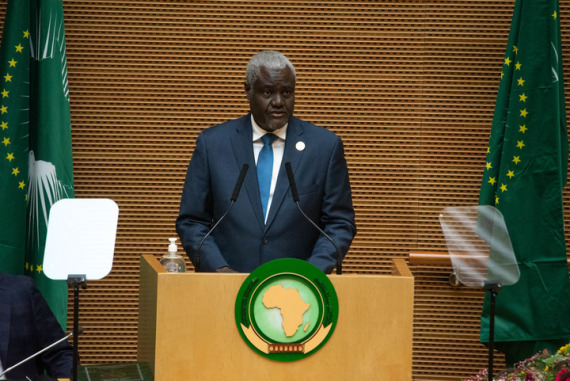
One of my favourite stories on pan-African action (or in this case inaction), one I will never tire of repeating, comes from 2002, when the discredited Organisation of African Unity, was rebranded into an ambitious, new African Union (AU).
There were many big hitters in African statehouses then. Talking of those who have had the grace to step down or leave honourably after electoral or political defeat, or have departed, in Nigeria we had Olusegun Obasanjo, a force of nature. Cerebral and studious Thabo Mbeki was chief in South Africa. In Ethiopia, the brass-knuckled and searingly intellectual Meles Zenawi ruled the roost.
In Tanzania, there was the personable and thoughtful Ben Mkapa. In Botswana, there was Festus Mogae, a leader who had a way of bringing out the best in people. In Senegal, we had Abdoulaye Wade, fresh in office, and years before he went rogue.
And those are just a few.
This club of men (there were no women at the high table) brought forth the AU. At that time, there was a lot of frustration about the portrayal of Africa in international media, we decided we must “tell our own story” to the world. The AU, therefore, decided to boost the struggling Pan-African New Agency (Pana) network.
The members were asked to write cheques or pledges for it. There were millions of dollars offered by the South Africans and Nigerians of our continent. Then, as at every party, a disruptive guest made a play. Rwanda, then still roiled by the genocide against the Tutsi of 1994, offered the least money; a few tens of thousand dollars.
There were embarrassed looks all around. Some probably thought it should just have kept is mouth shut, and not made a fool of itself with its ka-money. Kigali sat unflustered. Maybe it knew something the rest didn’t.
The meeting ended, and everyone went their merry way. Pana sat and waited for the cheques to come. The big talkers didn’t walk the talk. Hardly any came, and in the sums that were pledged. Except one. The cheque from Rwanda came in the exact amount it was promised. The smallest pledge became Pana’s biggest payday.
The joke is that it was used to pay terminal benefits for Pana staff. They would have gone home empty-pocketed.
We revive this peculiarly African moment (many a deep-pocketed African will happily contribute $300 to your wedding but not 50 cents to build a school or set up a scholarship fund), to campaign for the creation of small and beautiful African things.
It was brought on by the announcement by South Korea that it had joined the African Summit bandwagon, and is shortly hosting a South Korea-Africa Summit — like the US, China, the UK, the European Union, Japan, India, Russia, Italy, Saudi Arabia, and Turkey do.
Apart from the AU, whose summits are in danger of turning into dubious talk shops, outside of limited regional bloc events, there is no Pan-African platform that brings the continent’s leaders together.
The AU summits are not a solutions enterprise, partly because over 60 percent of its budget is funded by non-African development partners. You can’t seriously say you are going to set up a $500 million African climate crisis fund in the hope that some Europeans will put up the money.
It’s possible to reprise the Rwanda-Pana pledge episode; a convention of African leaders and important institutions on the continent for a “Small Initiatives, Big Impact Compact”. It would be a barebones summit. In the first one, leaders would come to kickstart it by investing seed money.
The rule would be that no country would be allowed to put up more than $100,000 — far, far less than it costs some presidents and their delegations to attend one day of an AU summit.
There would also be no pledges. Everyone would come with a certified cheque that cannot bounce, or hard cash in a bag. After all, some of our leaders are no strangers to travelling around with sacks from which they hand out cash like they were sweets.
If 54 states (we will exempt the Sahrawi Arab Democratic Republic for special circumstances) contribute $75,000 each, that is a good $4.05 million.
If just 200 of the bigger pan-African institutions such as the African Development Bank, Afrexim Bank, the giant companies such as MTN, Safaricom, East African Breweries, Nedbank, De Beers, Dangote, Orascom in Egypt, Attijariwafa Bank in Morocco, to name a few, each ponied up $75,000 each, that’s a cool $15 million just for the first year alone.
There will be a lot of imagination necessary to create magic out of it all, no doubt, but if I were asked to manage the project, I would immediately offer one small, beautiful thing to do.
After putting aside money for reasonable expenses to be paid at the end (a man has to eat) — which would be posted on a public website like all other expenditures — I would set out on a programme to get the most needy African children a dose of deworming tablets. Would do it all over for a couple of years.
Impact? Big. I read that people who received two to three additional years of childhood deworming experience an increase of 14 percent in consumption expenditure, 13 percent in hourly earnings, and nine percent in non-agricultural work hours.
At the next convention, I would report back, and possibly dazzle with the names, and photographs, of all the children who got the treatment. Other than the shopping opportunity, the US-Africa Summit would have nothing on that.
Charles Onyango-Obbo is a journalist, writer, and curator of the “Wall of Great Africans”. X@cobbo3
Strictly Personal
AU shouldn’t look on as outsiders treat Africa like a widow’s house, By Joachim Buwembo
Published
2 weeks agoon
May 9, 2024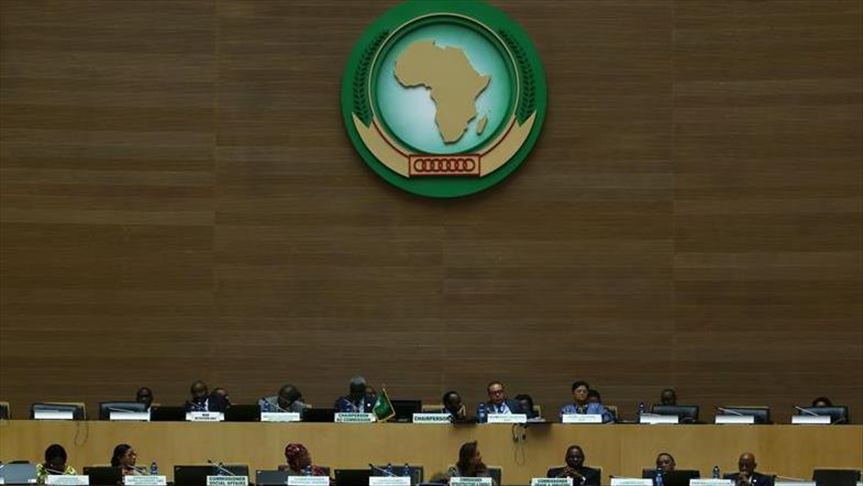
There is no shortage of news from the UK, a major former colonial master in Africa, over whose former empire the sun reputedly never set. We hope and pray that besides watching the Premier League, the managers of our economies are also monitoring the re-nationalisation of British Railways (BR).
Three decades after BR was privatised in the early to mid-nineties — around the season when Africa was hit by the privatisation fashion — there is emerging consensus by both conservative and liberal parties that it is time the major public transport system reverts to state management.
Yes, there are major services that should be rendered by the state, and the public must not be abandoned to the vagaries of purely profit-motivated capitalism. It is not enough to only argue that government is not good at doing business, because some business is government business.
Since we copied many of our systems from the British — including wigs for judges — we may as well copy the humility to accept if certain fashions don’t work.
Another piece of news from the UK, besides football, was of this conservative MP Tim Loughton, who caused a stir by getting summarily deported from Djibouti and claiming the small African country was just doing China’s bidding because he recently rubbed Beijing the wrong way.
China has dismissed the accusation as baseless, and Africa still respects China for not meddling in its politics, even as it negotiates economic partnerships. China generously co-funded the construction of Djibouti’s super modern multipurpose port.
What can African leaders learn from the Loughton Djibouti kerfuffle? The race to think for and manage Africa by outsiders is still on and attracting new players.
While China has described the Loughton accusation as lies, it shows that the accusing (and presumably informed) Britons suspect other powerful countries to be on a quest to influence African thinking and actions.
And while the new bidders for Africa’s resources are on the increase including Russia, the US, Middle Eastern newly rich states, and India, even declining powers like France, which is losing ground in West Africa, could be looking for weaker states to gain a new foothold.
My Ugandan people describe such a situation as treating a community like “like a widow’s house,” because the poor, defenceless woman is susceptible to having her door kicked open by any local bully. Yes, these small and weak countries are not insignificant and offer fertile ground for the indirect re-colonisation of the continent.
Djibouti, for example, may be small —at only 23,000square kilometres, with a population of one million doing hardly any farming, thus relying on imports for most of its food — but it is so strategically located that the African Union should look at it as precious territory that must be protected from external political influences.
It commands the southern entrance into the Red Sea, thus linking Africa to the Middle East. So if several foreign powers have military bases in Djibouti, why shouldn’t the AU, with its growing “peace kitty,” now be worth some hundreds of millions of dollars?
At a bilateral level, Ethiopia and Djibouti are doing impressively well in developing infrastructure such as the railway link, a whole 750 kilometres of it electrified. The AU should be looking at more such projects linking up the whole continent to increase internal trade with the continental market, the fastest growing in the world.
And, while at it, the AU should be resolutely pushing out fossil-fuel-based transportation the way Ethiopia is doing, without even making much noise about it. Ethiopia can be quite resolute in conceiving and implementing projects, and surely the AU, being headquartered in Addis Ababa, should be taking a leaf rather than looking on as external interests treat the continent like a Ugandan widow’s house.
Buwembo is a Kampala-based journalist. E-mail:buwembo@gmail.com
EDITOR’S PICK


Moroccan steeplechase star El Bakkali aims for gold at Paris Olympics
Morocco’s steeplechase champion, Soufiane El Bakkali, says he is aiming for the gold medal at the upcoming Paris Olympics after...


MTN Foundation announces 2024 scholarship for Nigerian students
MTN Nigeria Foundation has announced its 2024 scholarship for Nigerian students to support their education and empower the next generation...


One-year-old Ghanaian breaks GWR as world’s youngest artist
A one-year-old Ghanaian, Ace Liam, has broken a Guinness World Record as the youngest male artist. The infant’s groundbreaking achievement...
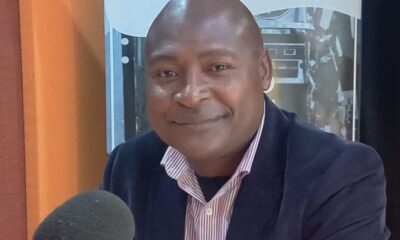

Introduction of taxation on online political content aligns with international practices, says UPND media director
The introduction of taxation on online political content aligns with international standard practices used by governments to broaden their tax...
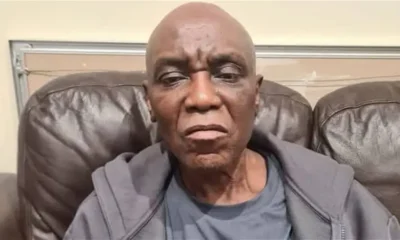

UK to deport physically-challenged Nigerian after 38 years
The United Kingdom has threatened to deport a physically-challenged Nigerian, Anthony Olubunmi George, after living in the country for over...


Nigeria’s Air Peace accused of safety violation by UK regulator
Nigeria’s Civil Aviation Authority has received a letter from the United Kingdom Civil Aviation Authority claiming that Nigerian carrier, Air...


How South Sudanese singer John Frog moved from child soldier to Afrobeats star
John Frog may be one of South Sudan’s most successful musicians at the moment, but a little over 10 years...


American risk management solutions provider Archer opens business in Egypt
American risk management solutions provider, Archer, has announced expanding its operations to Africa with Egypt as the first point of...
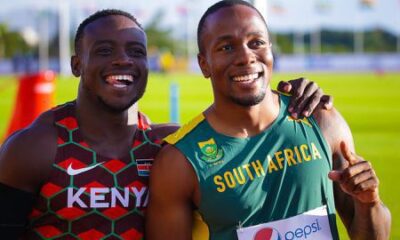

South African Akani Simbine beats Omanyala to pick 100m gold at Atlanta City Games
South African sprint sensation, Akani Simbine, on Saturday at the Atlanta City Games further put a dent on Kenyan 100m...


Church in Northern Province cautions against cyberspace abuse, supports cyber security law
The church in Northern Province has issued a warning to Zambians regarding the misuse of cyberspace in the guise of...
Trending
-

 Sports2 days ago
Sports2 days agoSouth African Akani Simbine beats Omanyala to pick 100m gold at Atlanta City Games
-

 Metro2 days ago
Metro2 days agoNigeria kicks as South African police torture citizen to death
-

 Musings From Abroad23 hours ago
Musings From Abroad23 hours agoNigeria’s Air Peace accused of safety violation by UK regulator
-

 Metro2 days ago
Metro2 days agoChurch in Northern Province cautions against cyberspace abuse, supports cyber security law


